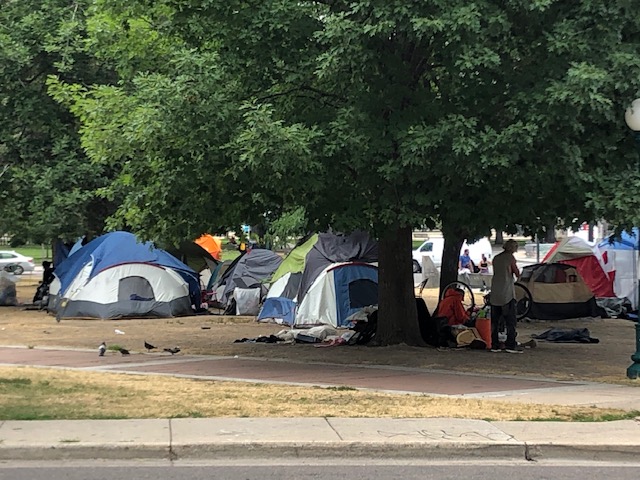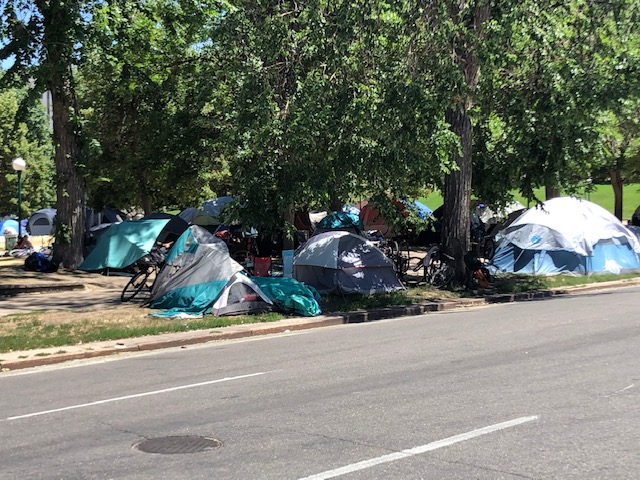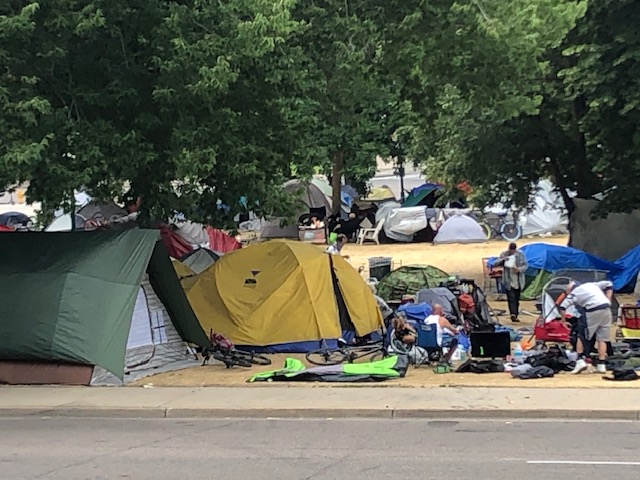DENVER — As concern heightens over a growing homeless camp near the state Capitol, frustrated lawmakers call the problem the result of a lack of leadership. The officials that could do something about it say they must weigh the benefit of shutting it down against the threat of coronavirus, which according to the Denver Department of Public Health and Environment (DDPHE) means there are no plans to clean it up.

The camp, which some question is not really a homeless camp, but a makeshift autonomous area, has become an eyesore and a health risk, legislators say. It’s one of many in the Denver Capitol Hill area, including an encampment on the street outside the Governor’s mansion and another one near Morey Middle School.
The area in question causing heartburn for Colorado Republican lawmakers is Lincoln Park, a piece of land that is owned by the state and bordered by Broadway and Lincoln streets on the east and west and 14th and Colfax avenues on the north and south. It lies just west of the state capitol building and just east of Civic Center Park.
There are no public bathrooms, the sprinkler system has been shut off because campers have broken sprinkler heads, rats can be seen in the park. Campers are defecating in public, and they are obstructing sidewalks.
“This is just another consequence of a lack of leadership in the metro area,” said Sen. Jerry Sonnenberg, the Republican senator who represents multiple counties across eastern Colorado. “Officials don’t support the police, so law and order take a back seat.”
According to Colorado State Trooper Josh Lewis, his office is aware of the issues, and despite being the law enforcement division that oversees the one square block park, there is nothing troopers can do.
 “Ultimately, we are aware of the camps, and we are aware there are bans on camping, but they fall under Denver ordinances, so it is not something that can be enforced by us,” Lewis said.
“Ultimately, we are aware of the camps, and we are aware there are bans on camping, but they fall under Denver ordinances, so it is not something that can be enforced by us,” Lewis said.
Tammy Vigil, DDPHE marketing and communications specialist, said the health department is also aware of the situation, and is actively monitoring it. However, she said they must balance it with the risk of spreading coronavirus. She added changes coming for campers on public land in other areas of Denver should spill over and help this situation as well.
“Lincoln Park is owned by the State but located in the City & County of Denver. As the local public health department, the Denver Department of Public Health & Environment has the authority to address conditions in the park that could be hazardous to public health,” Vigil said. “We partner with other city agencies and organizations to assess conditions of encampments and take measures to address public and environmental health and safety when necessary.”
Rep. Hugh McKean, R-Loveland, echoed Sonnenberg’s remarks, adding he doesn’t believe all the folks camping are actually homeless, that some are just taking up residence in a protest-like effort. McKean has been in contact with the state patrol, the governor, House of Representatives leadership and the health department numerous times trying to get the park cleaned up, to no avail.
Outsiders bring the campers food and supplies, which allows the squatters to continue to violate the camping ban and put a drain on public resources with the continual damage to the park, McKean said.
Vigil said DDPHE can temporarily restrict access to a public space if it identifies “significant hazards or deteriorating conditions in an area.” Yet it doesn’t, citing CDC guidelines around mitigating the risk of spreading the virus.

“We are aware of the impacts that can occur as a result of heavy and continual use of the park. However, with COVID-19 complicating matters, we have a responsibility to balance the risk considerations for those living in the park with the risk of spreading the virus,” Vigil said. “… DDPHE monitors park conditions and it is our understanding that outreach and services are regularly offered to those staying in the park.”
Vigil said a planned opening of “Safe Outdoor Spaces” should “provide better options for people experiencing homelessness in Denver while addressing the public health risks occurring in the growing number of encampments, including the encampment in Lincoln Park.”
However, no locations for the plan, which amounts to city-authorized camping, have been identified, and it is unclear when those might be up and running.
Sonnenberg and McKean both said the sight of what is being allowed to occur on state property is unacceptable.
“The number one visited historical site in Colorado is the state Capitol and it looks like the graffiti slums of any lawless nation,” Sonnenberg said. “I am outraged and embarrassed by the lack of leadership in this state.”


